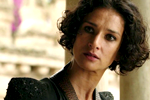Jumping right into July’s big queer book since June’s entries were posted so late.
Otherbound is the first novel by Corinne Duyvis, author of my much-loved On the Edge of Gone. Corinne Duyvis is queer and autistic and runs Disability in Kidlit online, and as I knew from the other novel there is a significant commitment to diversity! I wasn’t sure how that was going to pan out in Otherbound because it’s largely in a fantasy setting (where diversity is always… interesting) but never fear, there’s plenty to be found.
There are two protagonists to this story, whose points of view alternate: Nolan, a Mexican-American teenage boy in present-day Arizona (his father and sister also study Nahuatl, a native Aztec language), and Amara, a teenage servant girl in the fantasy-world Dunelands. Nolan has the ability to slip into Amara’s world and consciousness, which everyone around him perceives as epileptic seizures, and he also uses a prosthetic after losing part of one of his legs in a “seizure”-related accident; Amara is a healing servant, which means that her magical ability to heal is exploited to aid the princess she serves (who suffers from a curse that makes her essentially able to be killed by the slightest injury, which is of itself a chronic problem), and like all servants in her world her tongue was cut because they’re not permitted to speak, which means she communicates in sign language. Additionally, the princess, Cilla, is explicitly characterized as being not a white person (the terms used are all fantastical because of the world, but she’d be played – hopefully – by a dark-skinned black girl in a screen adaptation) and a large number of the other characters are as well. So, A+ right out of the gate.
And much like the story deals with physical diversity without fussing (Nolan’s disabilities are prominent, but because they affect his life and his family, and Amara is consciously aware that she signs instead of speaking, but the only one to characterize them as DIsabled People is a villain) it also deals with the b-word. Bisexuality! I don’t actually remember if it says the word in the text of the novel but it did win an award for bisexual rep and that’s on the back cover, so there’s no denying it. Amara is attracted to both male and female characters, and though there is some contention given the individual characters, there’s none regarding her orientation; there are also no explicit love triangles, which is a relief.
The actual story is compelling; the Dunelands are, as could be expected, fraught with peril, and both Amara and Nolan-in-Amara have to navigate all manner of surprises. The few big plot reveals can’t be spoiled without, well, spoiling things entirely; what can be said is that the action is heavily focused on the second half of the story. In order to familiarize the reader with these parallel worlds, the first few chapters are very slice-of-life, which isn’t bad but bears mention. The magic is specific but not so complicated one can’t wrap one’s head around it, and the parameters of the universe are understandable once explained.
I will also say, though – I kept sort of expecting something gross to come of a teenage boy being sometimes in a teenage girl’s body. It didn’t, really. There’s mention of some voyeurism, which once she realizes Amara is understandably upset about, but the narrative is refreshingly respectful. (I’m sure this is because the author isn’t male; I’m not saying it’s impossible for men to write female protagonists but it is much more likely to get sketchy fast.)
Overall, a good go! I like Duyvis’ other work better, probably because I relate to it more closely, but this was very entertaining and in parts compelling enough that I abandoned my daily page limit to find out what happened next.
–your fangirl heroine.

